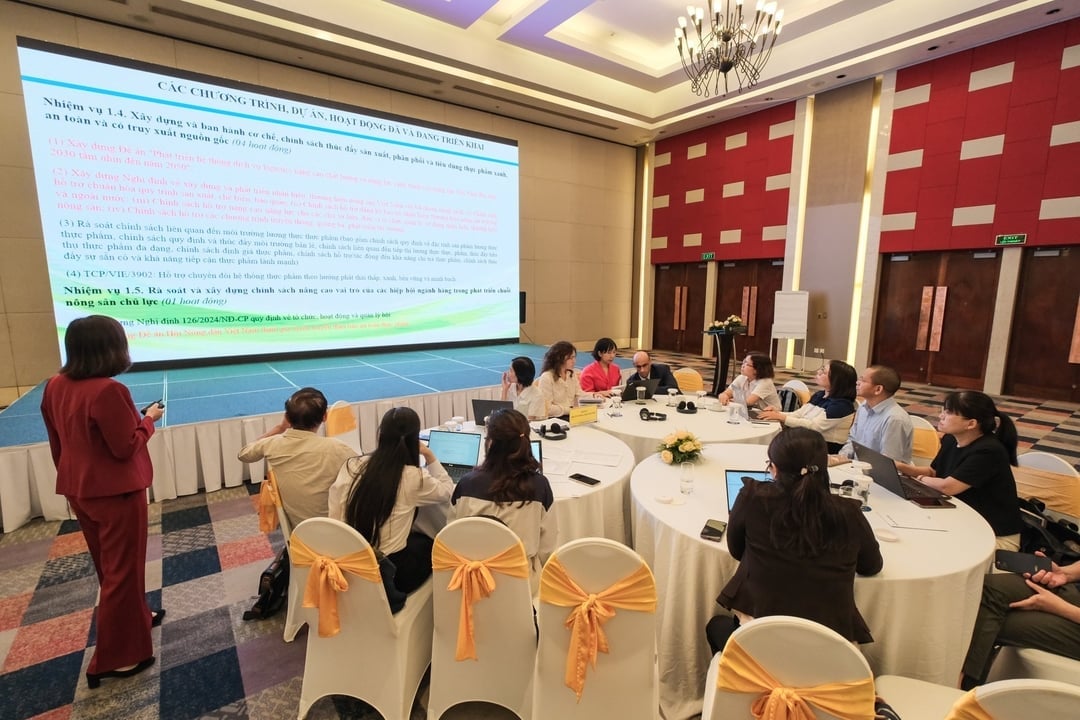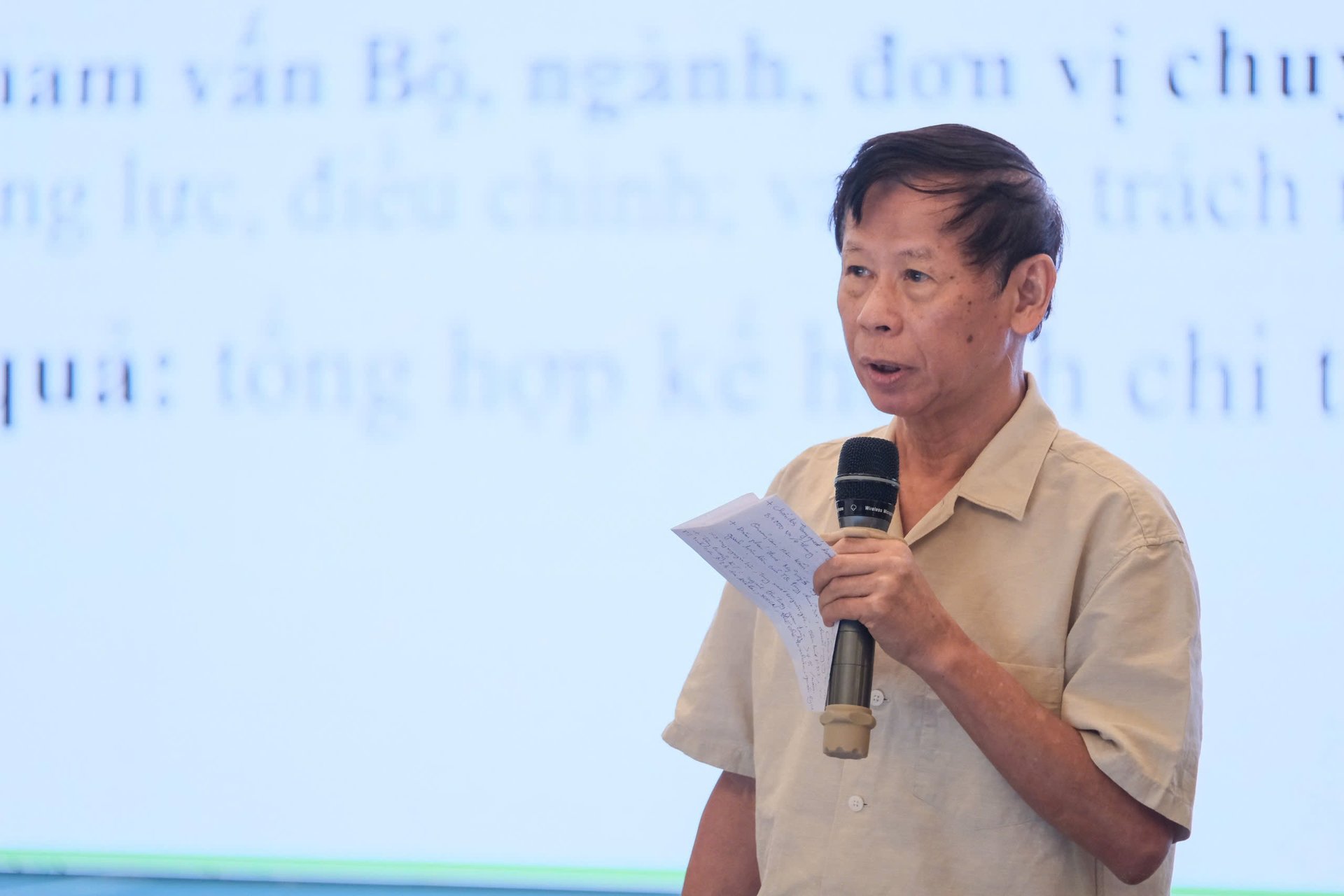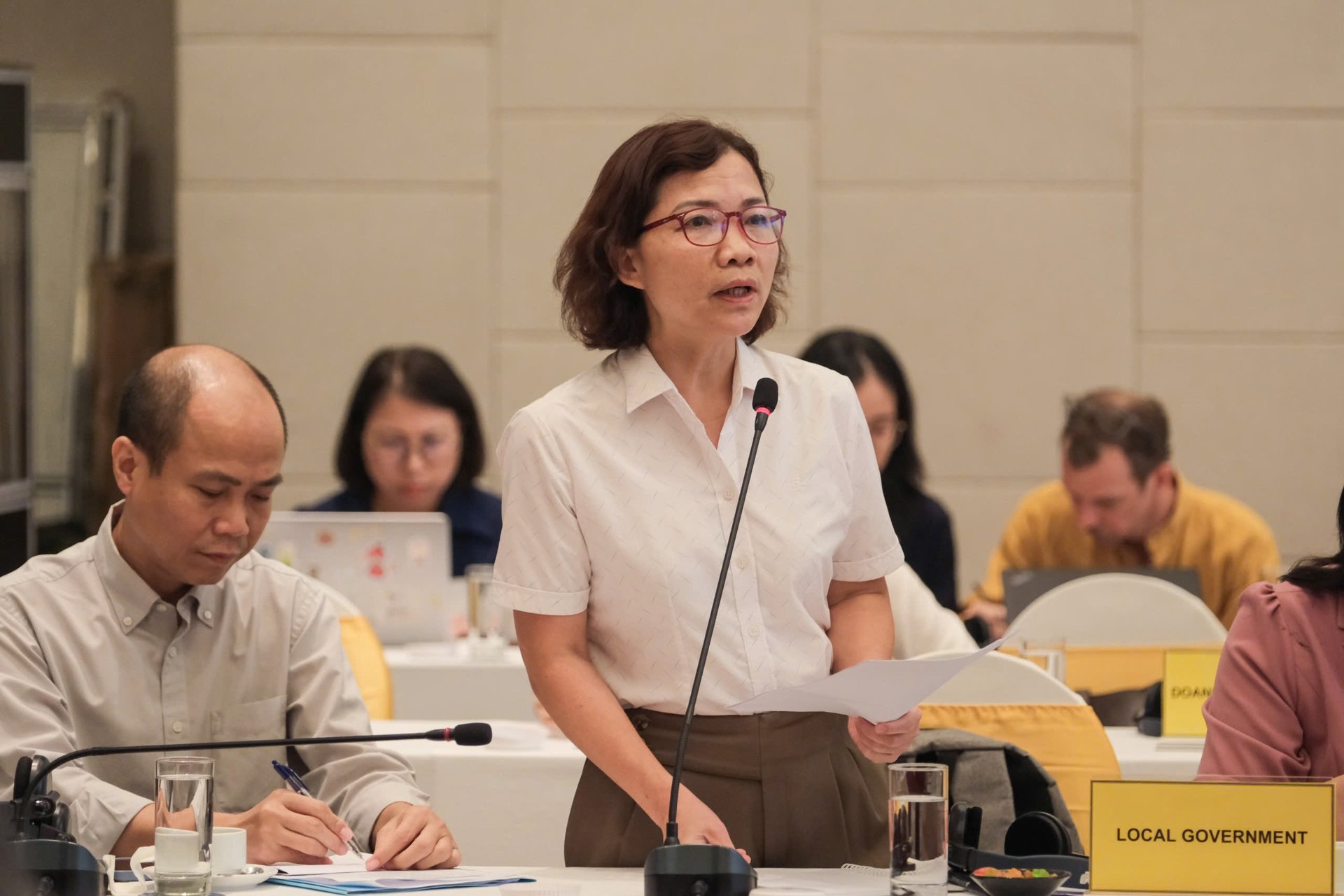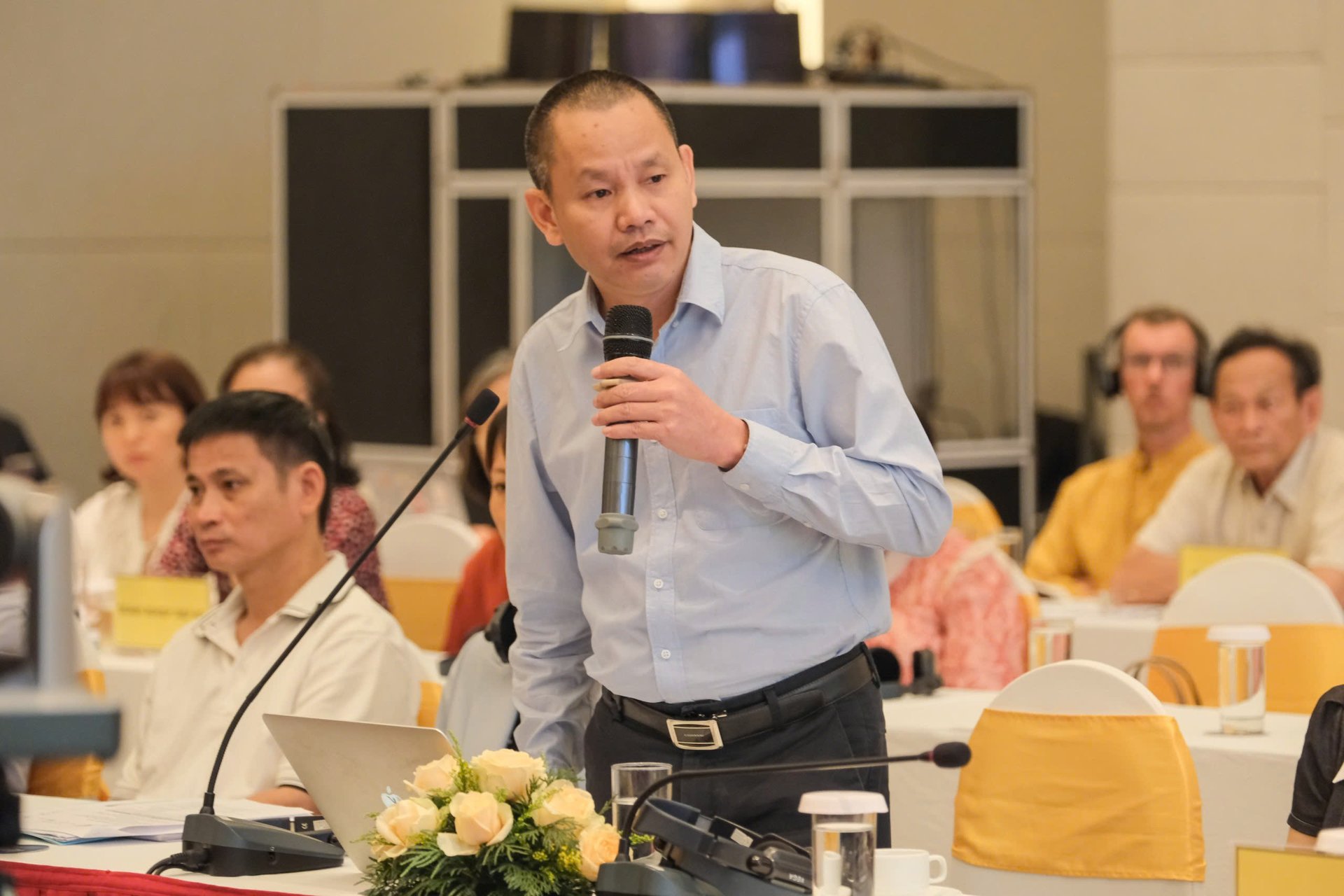December 1, 2025 | 11:38 GMT +7
December 1, 2025 | 11:38 GMT +7
Hotline: 0913.378.918
December 1, 2025 | 11:38 GMT +7
Hotline: 0913.378.918
On 24 June 2025 in Hanoi, the Ministry of Agriculture and Environment (MAE), in collaboration with the United Nations Development Programme (UNDP) and other stakeholders organized a consultation workshop on the Draft Project Implementation Plan (PIP) for the National Action Plan on Food Systems Transformation in Vietnam towards Transparency, Responsibility, and Sustainability by 2030. At the workshop, review key findings to develop strong mechanism supporting the National Action Plan.

Experts consulted on the draft detailed implementation plan for the National Action Plan on Food System Transformation, at a workshop co-organized by the Ministry of Agriculture and Environment and UNDP on June 24 in Hanoi. Photo: Quynh Chi.
On March 28, 2023, the Prime Minister issued Decision No. 300/QĐ-TTg, approving the National Action Plan for transforming Vietnam's food system into a transparent, responsible, and sustainable one by 2030 (Decision 300).
Decision No. 300 was issued at a pivotal moment, as Vietnam demonstrated its international commitment by hosting the 4th Global Conference of the Sustainable Food Systems. This decision also marked the result of a systematic approach initiated earlier in the decade, following the United Nations' official recognition of food system transformation as a pathway toward achieving the Sustainable Development Goals (SDGs).
After two years of implementation, members of the Food System Transformation Partnership Agreement, led by the Ministry of Agriculture and Environment (MAE), have actively participated and collaborated intersectoral to improve mechanisms and policies. Vietnam has increased transparency in the agricultural supply system, accelerated the issuance of codes for planting areas and certified packing facilities, and basically established five raw material zones for agricultural and forestry products.
The MAE, in collaboration with the Ministry of Health, has coordinated with international organizations to develop safe food distribution models based on circular economy principles, with a focus on nutritious foods and micronutrient-fortified products. The Partnership has also organized workshops and training sessions and introduced domestic and international quality standards. They have supported policies that encourage enterprises to participate in quality inspections, certification, and food safety assurance.
With recent breakthroughs in institutions and policies, the implementation roadmap for Decision 300 needs to be updated and specified to better align with the socio-economic context and the particular characteristics of each locality.

Dr. Dang Kim Son – Lead Expert – presented the draft detailed implementation plan for the transformation of Vietnam’s food system towards transparency, accountability, and sustainability by 2030, on June 24. Photo: Quynh Chi.
According to Dr. Dang Kim Son, former Director of the Institute of Policy and Strategy for Agriculture and Rural Development (now the Institute of Agricultural and Environment Policy Strategy), the detailed implementation plan for transforming the food system needs to update the four strategic pillars of the nation, including science and technology, integration, law, and the private economy.
In addition, with the upcoming operation of the two-tier government model in Vietnam, the Partnership needs to adjust the plan to meet new requirements and ensure timely implementation.
According to Dr. Dang Kim Son, although many positive results have been achieved, Vietnam’s food system still faces numerous challenges such as limited quality of inputs and agricultural production, inefficient value chain management, malnutrition, obesity, food safety issues, and environmental pollution. Therefore, the implementation plan for Decision 300 must emphasize intersectoral coordination, flexible adaptation, and ensure practicality along with sustainable development requirements.

Ms. Cam Thi Phong, Deputy Director of the Department of Agriculture and Environment of Son La, proposed establishing an effective inter-sectoral governance and coordination mechanism throughout the entire food safety system. Photo: Quynh Chi.
Son La is one of two provinces, alongside Dong Thap, selected as pioneers to implement the National Action Plan for provincial-level transformation of the food system.
Despite being a mountainous area with numerous challenges, Son La has gradually become a key region for Vietnam's raw material supply. Recognizing the potential for agricultural development on sloping land, the province has pioneered smart farming linked with environmental protection. As a result, Son La has emerged as a destination for sustainable agriculture.
Ms. Cam Thi Phong, Deputy Director of the Son La Department of Agriculture and Environment, affirmed that developing a sustainable food system cannot be the responsibility or effort of the agricultural sector alone. It requires coordinated, cross-sectoral, and comprehensive collaboration from central to local levels.
“I propose that the development of ecological agriculture models should go hand in hand with communication activities on safe, transparent, and responsible food. Additionally, emphasis should be placed on training and investing in digital infrastructure to enhance knowledge and innovation capacity, as well as creating favorable conditions for localities to access preferential financial resources,” Ms. Phong shared.

Mr. Hoang Van Tu, Director of the Ireland - Vietnam Agri-food Partnership (IVAP), believes that Vietnam should consider the private sector as an important component in transforming the food system. Photo: Quynh Chi.
According to Mr. Hoang Van Tu, Director of the Ireland-Vietnam Agrifood Partnership (IVAP), the private economy is not only an important financial resource but also a driving force for innovation, creating flexible and efficient production and business models. Therefore, Vietnam needs to proactively lead and consider the private sector as a key component in transforming the food system.
“We should view the detailed action plan for food system transformation as a partnership program, with updates every six months or annually among working groups. This will help monitor progress, assess impacts, and make necessary adjustments, thereby integrating isolated initiatives into a systematic, synchronized, and sustainable transformation,” Mr. Tu explained.
Agreeing with Dr Dang Kim Son, Ms Nguyen Thi Hong Minh - Chairwoman of the Association of Food Transparency, proposed establishing a system of dedicated inspectors at local levels to conduct on-site inspections of food production and business establishments. All inspection results need to be digitized and updated in a centralized management system, making it easier for consumers to monitor and access transparent information.
“Building a sector brand should be done by developing a common brand for each product group. Industry associations will play a coordinating role to promote cooperation, joint marketing, and quality control among businesses within the sector. This model not only helps increase the value of Vietnamese brands but also contributes to creating a food system that is both transparent and sustainable,” Ms. Minh stated.
Translated by Phuong Linh

(VAN) The Provincial Competitiveness and Governance Index (PCGI) is a tool designed to reflect the quality of local governance.

(VAN) An environmental expert has outlined eight strategic actions for Vietnam to successfully meet its commitment to achieve Net Zero emissions by 2050.

(VAN) After the institutional merger, Da Nang possesses significant forest-carbon reserves and is proactively engaging in the carbon market, creating a new revenue stream.

(VAN) An Giang strengthens communication against IUU fishing, increases inspections and sanctions, and is determined to remove the EC’s “yellow card” while developing a sustainable fisheries sector.

(VAN) As green transition becomes a global trajectory, Viet Nam’s biggest challenge is not only technology and models, but how to ensure that capital flows reach the right beneficiaries.

(VAN) The Ministry of Agriculture and Environment must spearhead the construction of green governance, spanning decision-making processes and investment standards to policy evaluation mechanisms.

(VAN) The Agriculture and Environment sector of Khanh Hoa has achieved numerous milestones over the past 80 years, contributing significantly to the goal of establishing the province as a centrally governed city by 2030.